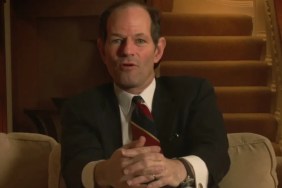The hot ticket on Saturday night at the 2010 Tribeca Film Festival was the sneak peak at filmmaker Alex Gibney’s Untitled Eliot Spitzer Film, a work-in-progress that Gibney screened at the SVA Theater for an audience of select people who were able to get tickets. NYC Police Commissioner Raymond Kelly was one of the many notables in attendance, but rumors of Spitzer’s own attendance proved to be unfounded.
After being introduced by the festival’s co-founder Jane Rosenthal, who has lovingly renamed the annual filmfest as the “Alex Gibney Film Festival” due to the number of movies Gibney has this year, Gibney came out before the movie to give a few thanks and give an introduction to a film which he seemed somewhat less confident about in terms of what the movie was – maybe because the paint hadn’t quite dried yet. Obviously, showing it at Tribeca was a pretty big deal considering Spitzer’s involvement with regulating Wall Street during his time as New York State Attorney General. In fact, Spitzer had targeted many of the practices that caused the economy to collapse months after his resignation as New York’s 54th Governor. Gibney admitted that being able to show the movie in its current format to a New York audience would help him make some decisions on what was working or not.
Screened with the temporary title “Client-9: The Rise and Fall of Eliot Spitzer”–a working title which Gibney said wouldn’t stick–the film was another collaboration between Gibney and Peter Elkind, his collaborator on the Oscar-nominated Enron: The Smartest Guys in the Room, who also wrote the companion book “Rough Justice: The Rise and Fall of Eliot Spitzer.” (It was somewhat ironic that this early cut of their new movie premiered almost five years to the date of the release of “Enron.”)
It’s certainly a very different movie for Gibney, done in a very different style than his other rags-to-riches-then-back film Casino Jack and the United States of Money about lobbyist Jack Abramoff. Gibney narrates the documentary himself for the first time since the Oscar-winning Taxi to the Dark Side, and unlike in past movies, we actually hear Gibney asking questions off-camera of his various subjects, most notably Spitzer himself during four interview sessions. That interview style has been most commonly used by Owen Morris, raising instant comparisons to Morris’ own The Fog of War, but it’s certainly effective at capturing the real Eliot Spitzer.
The film essentially tells two stories at the same time, the first being Spitzer’s rise through the political world as New York’s tough attorney general, making enemies on Wall Street and then in Albany once he became governor. The second story is somewhat more lurid, delving into the world of high-priced escorts and the clients who use them, the film essentially jumping back and forth until the third act when the two worlds finally collide.
One of Gibney’s more interesting decisions was to have an actress portraying the mysterious “Angelina,” the escort who spent the most time with Spitzer who now happens to be a commodities trader. This actress basically reads the first-hand accounts of the escort’s encounters with Spitzer, giving them a nice bit of flair. Even with all the juicy “inside baseball” stories shared by all involved it’s the Emperor Club’s bubbly madam Cecil Suwal who steals the movie with her often naïve responses to Gibney’s queries, maybe because she’s so unlike any of the subjects who’ve ever appeared in an Alex Gibney documentary, further emphasizing between Spitzer’s serious political world and his playtime indiscretions with paid escorts. Surprisingly, the film doesn’t deal much with the involvement of Ashley Dupre aka “Kristen” in the former Governor’s downfall, except to get a few insights into her mindset from some of her cohorts in the escort business.
Otherwise, the film is quite thorough and in-depth, covering many of Spitzer’s bigger cases as Attorney General, talking both to his close personal advisors as well as some of the enemies he made along the way, including Republican Senate leader Frank Bruno and investment banker Ken Langone. Even so, the film does a fairly good job remaining fairly unbalanced, at times feeling like an indictment of Spitzer’s behavior but at others allowing the viewer to sympathize with him as a victim of his own hubris, essentially making more enemies than friends through his ascent.

From what we saw, Gibney certainly has a strong foundation for another great doc, although the movie certainly can be tightened and shortened to be more effective at keeping the audience’s interest during some of the duller moments involving Spitzer’s Wall Street cases. It didn’t really feel like the movie needed to spend as much time on them to make its point, and in general, the interview with Spitzer and the film’s look into the world of escorts are the main draws.
After the screening, Gibney answered a few questions from the audience, including what made him interested in making a film about the disgraced governor. “Jedd and Todd Wider called me up and asked me if I’d be interested in doing this not long after the scandal happened,” Gibney said. “It was a scandal that everybody was talking about for all sorts of different reasons, not only reasons having to do with relationships between men and women, infidelity, sex and power, but also things having to do with the economy and the role he had played, the timing of when he went down. There are all sorts of stories floating around and it seemed to me a really interesting story for all sorts of reasons, but in ways I couldn’t quite grasp or necessarily articulate. So I thought maybe by telling the story I’ll come to some sense of that. I guess I would say I made the film to say what I wanted to say. In other words, what’s included, why it’s included, to come up with an overall portrait of this event, I hope will be provocative. If I could have said it more simply, I wouldn’t have gone to the trouble of making the film.”
When asked why he thought Spitzer participated with the making of the movie and agreed to be interviewed, Gibney responded, “I think he knew that the film and the book were going to be done anyway, and I think based on what we had done in the past, he had some confidence that we were going to do a good and thorough job, and it was better for him to speak than not speak. There was no quip pro quo in terms of his participation. There was no editorial control by Spitzer. The only thing Peter Elkind and I said as we spoke to him–he for the book and me for the film–was that as we discovered stuff, we would check it with him for factual accuracy and that’s all we did, but outside of that he had absolutely no control over it.” Gibney didn’t believe Spitzer had seen the movie yet even though he was invited to screen it before its Tribeca debut.
When asked whether he thought Spitzer might make another run to reenter politics, Gibney seemed optimistic. “There’s no question that he’s become public about certain key issues linked to the political economy. I know he’s deeply frustrated that he’s on the sidelines. He feels this is his time in the wake of the economic meltdown, so I think he wants back in. The question is whether the people are willing to let him back in. I think that’s an open question. We’ll have to see.”
The next day, Gibney debuted another new film My Trip to Al-Qaeda, which will be shown on HBO later this year. It brings journalist and screenwriter Lawrence Wright’s Off-Broadway one-man show of the same name to the screen with lots of insider information about the roots of the terrorist organization and how Osama bin Laden rose to power with control over an army of Muslim extremists. It couldn’t be any more different than Spitzer’s other new film if it tried, partially because it’s far more serious. The movie really is one man’s personal journey through a world few of us have experience first-hand while researching his book “The Looming Tower,” coming out the other side with many insightful opinions on what led bin Laden’s group to the 9/11 terror attacks.
Wright’s a terrific writer, though not a particularly charismatic performer, which does make it trying at times to stay interested and focused on such a tough subject for the movie’s entire 89 minutes. There’s also quite a bit of information that’s already been well covered in other docs, whether it’s Gibney’s own Taxi to the Dark Side or others. It’s still a fairly non-sensationalistic study on the origins of terrorism and how 9/11 could have been avoided, and hopefully the movie will act as the last word on the subject. Nearly nine years on from the attacks, it feels like documentary filmmakers need to move on and find new subjects to explore.
Alex Gibney will continue his presence at the Tribeca Film Festival with a segment in the Closing Night film Freakonomics and then a week later, his new movie Casino Jack and the United States of Money will be released in New York and L.A. on May 7.







